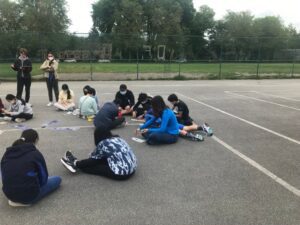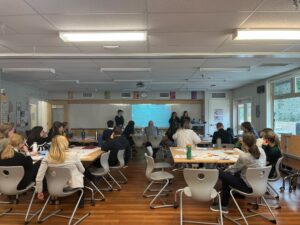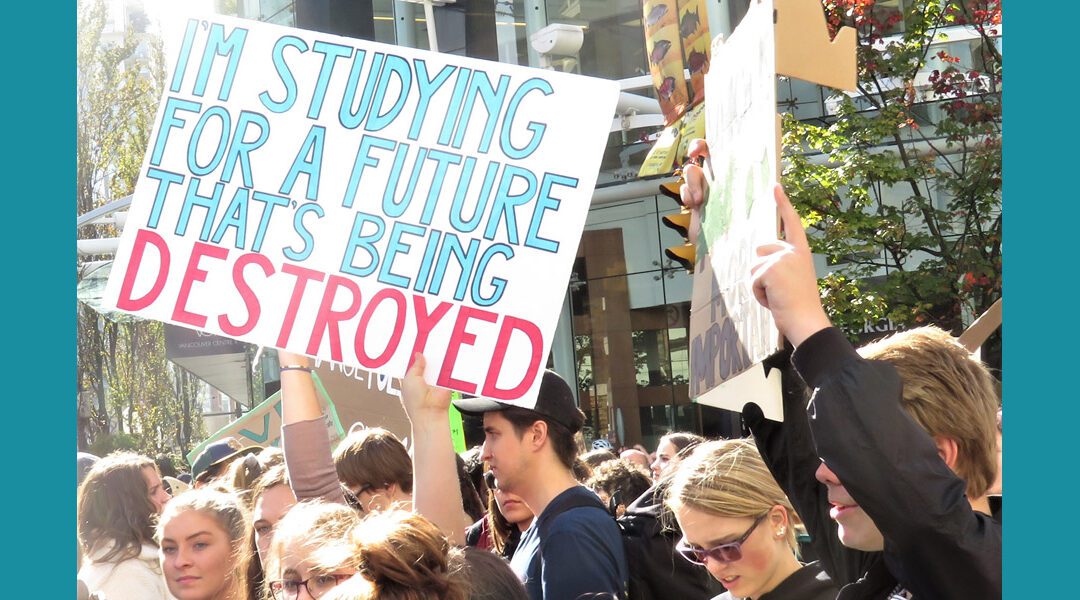“I felt like I could take initiative and make an impact. Even if it was just in the school, I can still make a difference in my community.”
Vancouver High School Student
Nearly 2,000 Vancouver high school students participated in a climate justice program aimed at empowering youth (12 to 18 years) to take community-based climate action. The two-year project which wrapped up in 2024 was organized by Be The Change Earth Alliance (BTCEA), a Vancouver-based group supporting environmental and social change in schools and communities.
BTCEA has worked with youth since 2005 to harness their energy and passion into tangible climate action.
“You’ll see them quite often not knowing what climate action they can take, not really feeling super empowered and not feeling prepared or having the resources and support to take meaningful action. We wanted to ensure they felt supported, empowered altogether,” says Anna Tokunaga, BTCEA’s executive director.

This collaborative climate justice program with partners from UBC and the Vancouver School Board was informed to some extent by a two-year pilot project in Vancouver high schools which began in September 2020.
“It was hard because it was the beginning of the pandemic lockdown. Our program had an online focus. It was tricky but we provided leadership workshops. We developed guidebooks so students could do deeper research,” adds Tokunaga.
Over a two-year period, student teams:
- Revamped their school’s recycling system to become student-led;
- Challenged students to reduce their carbon footprints;
- Designed and conducted climate workshops;
- Created a more sustainable school cafeteria; and
- Developed ecological rain gardens to divert run-off into storm drains.

Then in 2023, with a grant of $40,000 from the city of Vancouver’s Greenest City fund, a second iteration of the program was launched, this time with a focus on climate justice.
“We wanted them to think about how they can help those most in need, to think about climate inequity in their projects. We also provided climate story telling workshops to help youth find their voice.”
Throughout the project, students from Grade 8 to 12 received a mix of mentorships, training workshops, guidebooks and funding. Their projects included the cleanup of natural habitats; delivery of education workshops to younger students; and, a letter writing campaign to city council asking for further action on climate change. Also, multiple clothing swaps were organized in schools as a way to educate students on the impact of fashion on the environmental movement.
“Youth want to shine a light on the fact that we have more clothes than we need. So, at these clothing swaps you can get new things. You’re not contributing to more clothes going to the landfill.”
And in a switch from the usual teaching model, a group of youth from six different schools developed and delivered professional development workshops for teachers in their schools. At the sessions, the student team shared their climate stories with teachers.

“The students talked about their personal experience, feeling the stress, the anxiety that the climate crisis is causing them and then how climate issues could be brought into the classroom more directly. It was really positive I think for teachers to see students in that light and also for students to see their teachers who are passionate and working hard to do this. It was exciting to see youth step into their own voices,” said Tokunaga.
In a wrap-up report, BTCEA stated that 80 percent of teachers who attended the workshops got ideas for how to bring climate justice education into the classroom with one teacher saying ‘I was so inspired by the student presenters and resulting group discussion. Definitely left feeling invigorated.’
In the end, the two projects spanning four years have involved 1800 high school students with an additional 1800 members of the community who have been positively affected. With many students graduating, they leave a legacy for others in leadership roles and perhaps to promote climate education in new ways.
As noted by a workshop participant, “Personally, the workshop and knowledge I gained from it really inspired me to think more on climate change. I loved how (the facilitators) told personal stories on their own journey which helped me relate to them. It also showed me that everyone can take action to stop climate change.”
Photo Credits:
Feature Image – Bill Stovin at Vancouver Climate Strike
Images within article – Be the Change Earth Alliance


